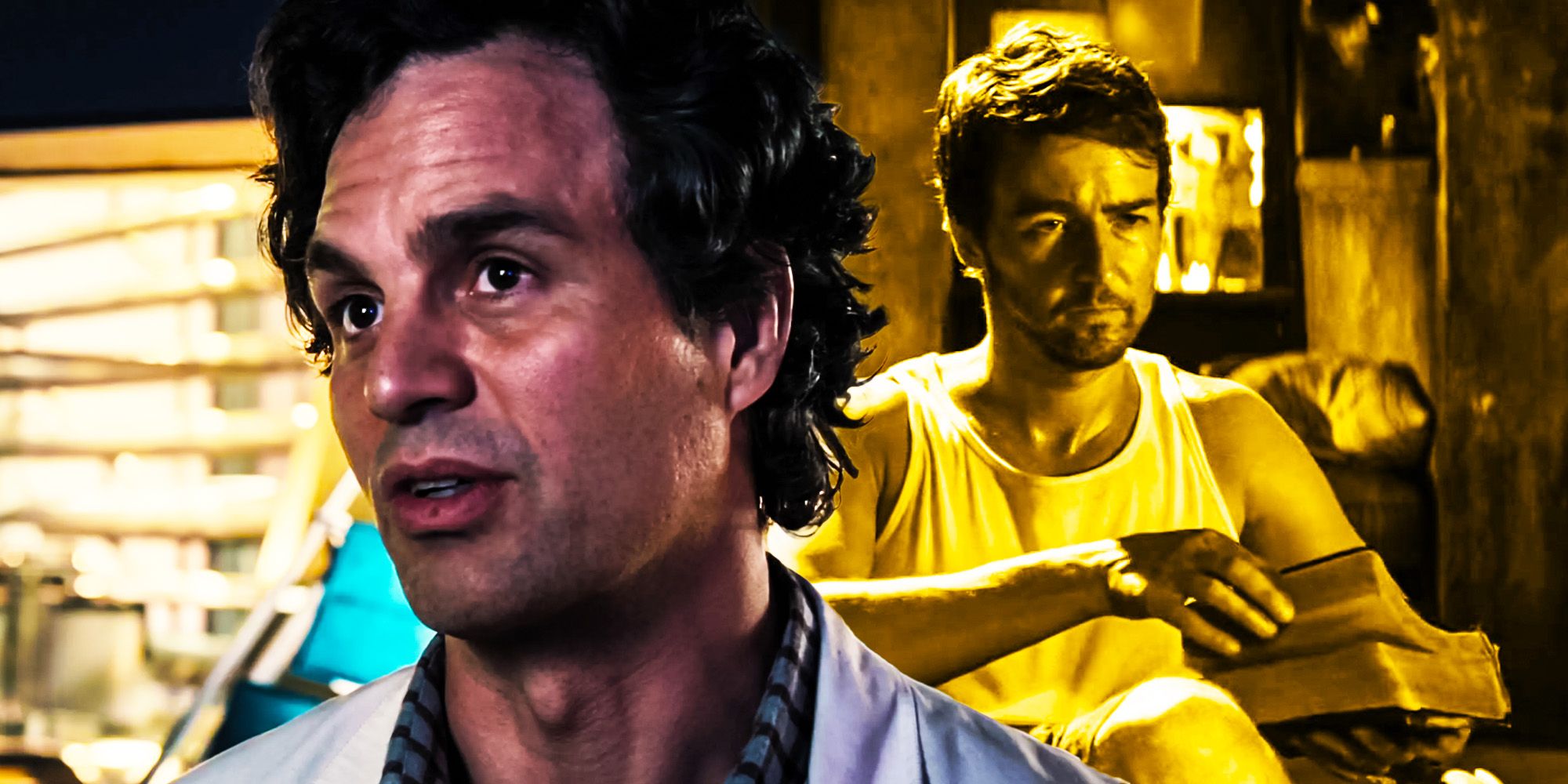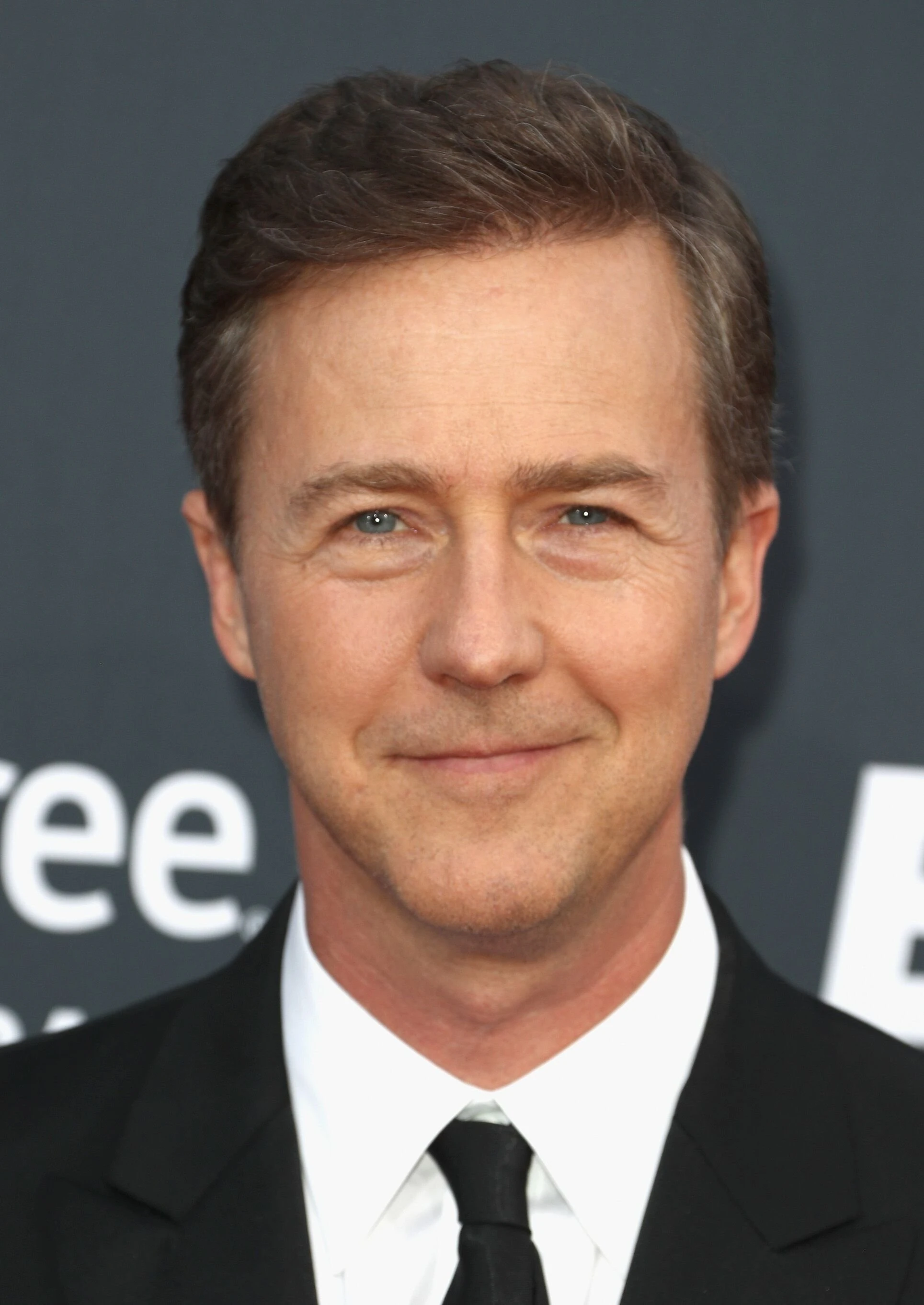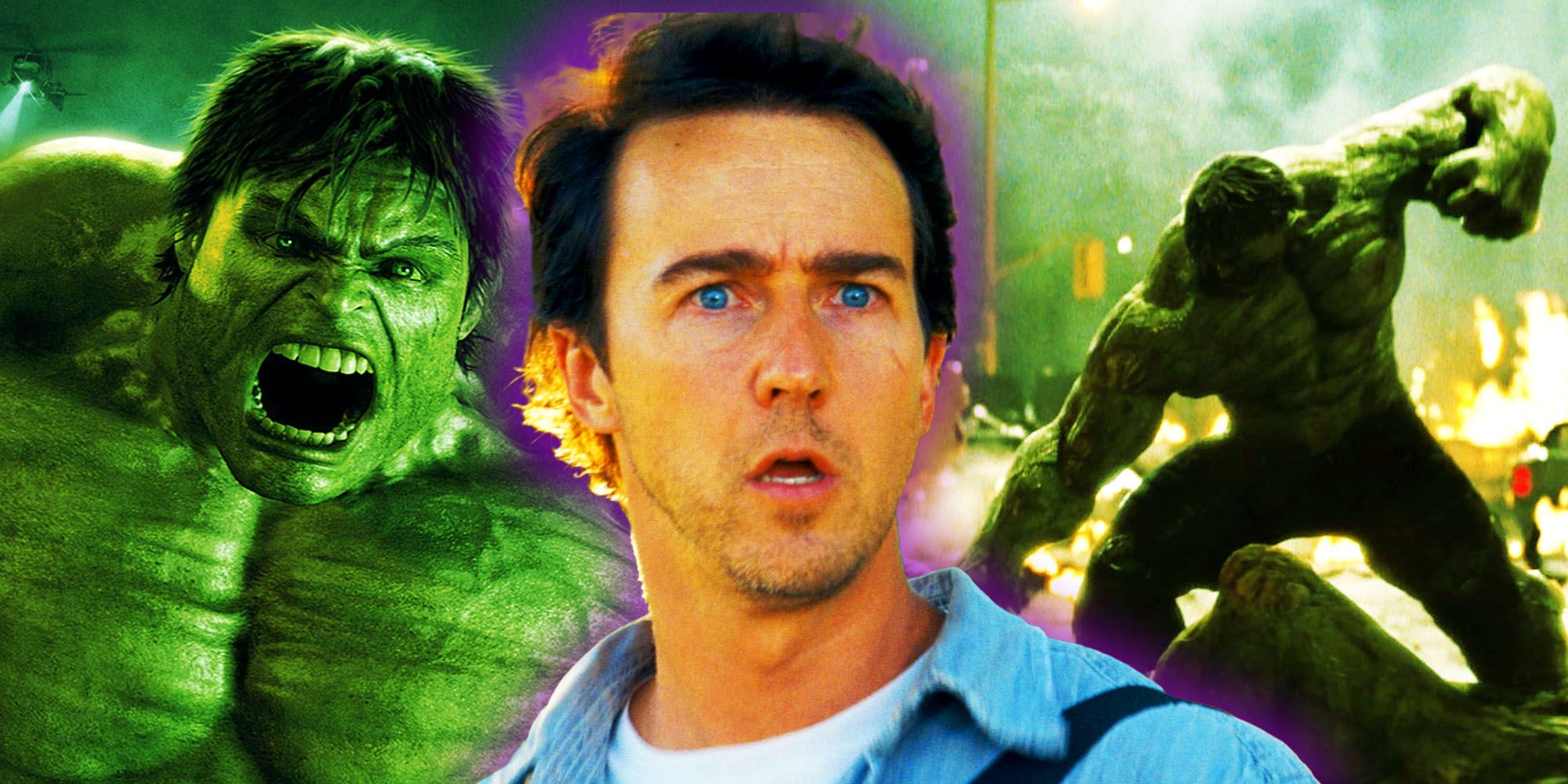The Story Of Edward Norton And The Hulk Casting
Have you ever wondered about the big changes behind the scenes of your favorite superhero movies? It's almost like, sometimes, the stories off-screen are just as fascinating as the ones on-screen. One of the most talked-about moments in early Marvel Cinematic Universe history involves the initial casting of the Hulk, and how Edward Norton came into that powerful role. This particular casting choice, and the events that followed, truly shaped the big picture of what the MCU became.
For many fans, Edward Norton's portrayal of Bruce Banner, the brilliant scientist who turns into the giant green hero, was their first real look at the Hulk in this new movie universe. It's a rather interesting piece of film history, considering how beloved the character is today. The decisions made back then, you know, about who would play such an iconic figure, had a lasting effect on the entire series of films.
We're going to take a closer look at the whole situation, from how Edward Norton first got the part to why things changed later on. It's a story that involves a lot of creativity, different ideas about how a character should be, and the huge task of building a connected movie world. So, it's pretty much a deep dive into a significant moment for anyone who loves these big superhero stories.
- Johnny Depp Attorney
- Tim Mcgraw How Tall
- Hugh Jackman Kushner
- Jeff Bridges Health 2025
- Isabel May Net Worth
Table of Contents
- Edward Norton: A Brief Look
- The Original Casting for The Incredible Hulk
- The Recasting Decision
- Impact on the MCU
- Frequently Asked Questions About the Hulk Casting
Edward Norton: A Brief Look
Edward Norton is an actor known for taking on very complex and often intense roles. He has a reputation for being deeply involved in the making of his films, sometimes even helping with the writing. This dedication to his craft is a big part of why he's so respected in the film world, you know, for his powerful performances.
The name "Edward" itself, as a matter of fact, is an English male name. It means "prosperous guardian, protector." This meaning, in a way, oddly suits the role of Bruce Banner, who, despite his struggles, often acts as a protector, especially when he transforms into the Hulk. It's just a little interesting connection, isn't it?
Edward Norton: Personal Details & Bio Data
| Full Name | Edward Harrison Norton |
| Birth Date | August 18, 1969 |
| Birth Place | Boston, Massachusetts, U.S. |
| Occupation | Actor, Filmmaker |
| Notable Films (Selected) | Primal Fear, American History X, Fight Club, The Illusionist, The Incredible Hulk, Birdman |
The Original Casting for The Incredible Hulk
When Marvel Studios was just getting started with its grand plan for a connected universe, they needed someone special to play the Hulk. The first film to feature this version of the character was "The Incredible Hulk," released in 2008. This movie followed "Iron Man," and it was a pretty important step in showing how these heroes could exist in the same world.
- Zach Wilson Net Worth
- James Mcavoy It
- Harrison Ford Car Commercial
- Leonardo Dicaprio Environmentalist
- Bob Sapp Net Worth
Edward Norton was chosen for the part of Bruce Banner, the brilliant scientist who, when stressed or angry, turns into the powerful green giant. His casting, you see, was met with a lot of excitement. He was already well-known for his serious acting skills and for choosing roles that really let him show his range. Fans were eager to see what he would bring to such a beloved comic book character, especially one with such deep emotional struggles. It was, arguably, a very bold choice for the studio.
The idea was to present a Hulk that was both physically imposing and emotionally complex. Norton, with his history of playing troubled characters, seemed like a perfect fit for a man constantly battling his inner beast. He brought a certain gravitas to the role, which many felt was necessary for the character to be taken seriously within a broader cinematic world. This initial step was crucial for building the foundation of what was to come, more or less setting the stage for future hero appearances.
Norton's Vision for the Hulk
Edward Norton didn't just want to be an actor in "The Incredible Hulk"; he wanted to be deeply involved in shaping the story. He's known for his desire to contribute to scripts, and this project was no different. He apparently had very specific ideas about Bruce Banner's journey and how the Hulk's story should unfold over time. He saw the character's internal conflict as something truly central, you know, to the whole narrative.
His vision, it seems, leaned towards a darker, more psychological exploration of the character. He wanted to show the real weight of Bruce Banner's condition, the constant struggle to control something so powerful and unpredictable. This approach was, in a way, very much in line with his previous work, where he often explored the deeper, more troubled aspects of human nature. He believed the Hulk's story could be a profound look at identity and control.
He reportedly worked on the screenplay, aiming to make the narrative more layered and character-driven. This kind of hands-on approach, while valued by some, can sometimes lead to differences in opinion with a studio. For Norton, it was about making sure the character's arc felt authentic and meaningful, not just a series of action sequences. He wanted the audience to really feel Bruce's pain and his desperate search for a cure, which is a very human desire, isn't it?
He saw the Hulk as a character with immense potential for growth and change across multiple films. This long-term perspective was something he reportedly discussed with the filmmakers. He was thinking beyond just one movie, picturing how the character would evolve and fit into a much larger story. This kind of foresight, in some respects, shows his commitment to the role and the potential of the universe being built.
The Creative Differences
Despite Edward Norton's deep involvement and clear vision, there were, as it turned out, some significant disagreements during the production of "The Incredible Hulk." These were often described as "creative differences," a phrase commonly used in Hollywood when parties can't agree on the direction of a project. It's basically about different ideas clashing, you know, over how things should be done.
The main point of contention was apparently the final cut of the movie. Norton reportedly had a longer, more character-focused version in mind, while the studio, Marvel, wanted a film that was shorter, faster-paced, and more action-oriented. They were, in a way, trying to balance the artistic vision with the commercial needs of a big superhero blockbuster. This kind of tension is pretty common in filmmaking, especially with large franchises.
Marvel, at that time, was just beginning to build its cinematic universe. Their goal was to create films that were accessible to a wide audience and that could easily connect to future movies. Norton's desire for a more nuanced, perhaps less conventional, superhero film might have gone against this broader strategy. It's a bit like trying to manage a huge financial portfolio; you need to make decisions that serve the overall goals, and sometimes individual investments might need to adjust. Just like with Edward Jones, where you can learn more about managing your goals, studios also manage their creative assets.
The disagreements eventually led to a situation where Norton and Marvel couldn't find a common ground for moving forward. It wasn't about a lack of talent or effort on either side, but rather a fundamental difference in how they saw the character and the film's place within the emerging universe. This kind of situation, you know, can be very challenging for everyone involved, especially when there's a lot of passion for the project.
Ultimately, the studio had the final say on the version of the film that was released to the public. This decision, in a way, marked a turning point for Norton's involvement with the character. It highlighted the challenges of balancing an actor's artistic integrity with the demands of a large studio franchise. It was a very public example of how creative control can be a tricky thing in the movie business.
The Recasting Decision
After "The Incredible Hulk" was released, it became clear that Edward Norton would not return for future Marvel films. This was a pretty big announcement at the time, given how much buzz there had been around his casting. Marvel Studios released a statement explaining the decision, saying they needed an actor who embodied the "creativity and collaborative spirit" of their other cast members. This statement, you know, made it sound like the creative differences were indeed a major factor.
The studio's perspective was that the role of Bruce Banner required someone who could easily fit into an ensemble cast and work within the specific framework of the Marvel Cinematic Universe. They were building something massive, a sprawling story with many interconnected parts, and every actor needed to be a piece of that larger puzzle. It was about finding the right fit for the long haul, rather than just for one film. This is, in some respects, how big projects manage their resources and talent.
Norton, for his part, also released a statement, expressing his disappointment but wishing the project well. He acknowledged the different approaches to filmmaking and the challenges of working within a big studio system. It was a rather polite way of acknowledging the disagreements without going into too much detail. This kind of public statement, actually, helps manage expectations and keep things professional.
The decision to recast was not taken lightly, as the Hulk is a very important character in the Marvel comic book world. Finding a new actor who could step into the role and make it their own, especially after Norton's performance, was a significant challenge. It was a moment of uncertainty for fans, wondering how this change would affect the upcoming "Avengers" movie and the future of the character. This period was, arguably, a bit of a nail-biter for the studio.
The focus then shifted to finding an actor who could bring a similar depth to Bruce Banner while also being more aligned with the studio's collaborative vision. This search was crucial for the success of "The Avengers" and for the continued growth of the entire cinematic universe. It was a critical point in the early days of the MCU, more or less setting a precedent for how they would handle talent moving forward.
Mark Ruffalo Steps In
With the role of Bruce Banner now open, Marvel Studios began the search for a new actor to join the cast of "The Avengers." This was a huge moment for the franchise, as "The Avengers" was meant to be the culmination of several solo hero films, bringing them all together for the first time. The choice for the new Hulk actor would have a massive impact on the film's dynamic, you know, and the character's future.
The actor chosen to replace Edward Norton was Mark Ruffalo. His casting was announced in 2010, and it was met with a mix of surprise and excitement from fans. Ruffalo was known for his versatile acting, often playing nuanced and empathetic characters. He brought a different energy to Bruce Banner, one that felt a bit more vulnerable and relatable, perhaps even a little more gentle in his human form. This was, in a way, a fresh take on the character.
Ruffalo's portrayal of Bruce Banner in "The Avengers" quickly won over audiences. He managed to capture the intelligence and inner turmoil of Banner while also bringing a charming awkwardness to the role. His chemistry with the other Avengers cast members was undeniable, and he seamlessly integrated into the team. This was, basically, a huge success for the studio, proving their recasting decision was the right one for their grand plan.
His performance helped solidify the Hulk's place as a core member of the Avengers. Ruffalo's version of the character became incredibly popular, appearing in multiple subsequent Marvel films. He brought a consistent and beloved portrayal that continued for many years, helping to define the character for a whole new generation of fans. It's pretty amazing how one casting change can alter the course of such a big story, isn't it?
Impact on the MCU
The change in the **edward norton hulk cast** had a pretty big impact on the Marvel Cinematic Universe, even if it's not always talked about directly. It showed, for one thing, that Marvel Studios was very serious about its long-term vision for the connected universe. They were willing to make tough decisions to ensure that all the pieces fit together seamlessly, you know, for the bigger picture.
This recasting also helped establish a pattern for how Marvel would handle its characters and actors going forward. It reinforced the idea that the characters themselves, and the overarching story, were the most important elements, even more so than any single actor's individual vision. This approach, in a way, has been key to the MCU's incredible success, allowing them to tell a continuous story across many films and TV shows. It's a bit like how Edward Jones manages wealth, ensuring all parts of the plan work together for a secure future, and you can access your account securely online to see your progress.
Mark Ruffalo's take on the Hulk brought a different kind of energy to the character, one that many fans found incredibly appealing. His version of Bruce Banner felt more integrated with the rest of the Avengers, perhaps a little less brooding and more collaborative. This shift helped the team dynamic in "The Avengers" and subsequent films, allowing for more humorous moments and a broader range of interactions. It was, arguably, a very positive change for the overall tone of the universe.
Looking back, the decision to change the **edward norton hulk cast** was a pivotal moment. It set a precedent for how Marvel would build its universe, prioritizing continuity and a collaborative spirit among its talent. It also gave us the beloved Mark Ruffalo as the Hulk, who has become a staple of the MCU. It's a clear example of how big decisions behind the scenes can truly shape the stories we see on screen for years to come.
Frequently Asked Questions About the Hulk Casting
Why was Edward Norton replaced as the Hulk?
Edward Norton was replaced as the Hulk due to what Marvel Studios described as "creative differences." Apparently, there were disagreements over the final cut of "The Incredible Hulk" and the overall direction of the character within the emerging Marvel Cinematic Universe. Marvel wanted an actor who was more aligned with their collaborative approach for the long-term, which is a very common challenge in big film productions.
Who played the Hulk before Mark Ruffalo?
Before Mark Ruffalo took on the role, Edward Norton played Bruce Banner/the Hulk in the 2008 film "The Incredible Hulk." This was the second movie in the Marvel Cinematic Universe, following "Iron Man." Norton's performance was the first live-action portrayal of the Hulk in this new, connected superhero world, so it's a pretty important part of the MCU's early history.
What was Edward Norton's vision for his Hulk character?
Edward Norton reportedly had a vision for his Hulk character that leaned towards a more serious, psychological exploration of Bruce Banner's struggles. He wanted to delve deeper into the character's internal conflict and explore the human cost of his condition. He also aimed for a more character-driven narrative and, in a way, a multi-film arc for the Hulk, which was perhaps a bit different from the studio's initial plans for a more action-focused blockbuster.
- Tom Hanks End Of The World Movie
- Cillian Murphy Gemini
- Greg Kinnear Net Worth
- Tom Hardy Jiu Jitsu Tournament
- Clinton Portis Net Worth

Edward Norton's Hulk Recast Acknowledged By Marvel... 10 Years Late

Edward Norton | Hulk Wiki | Fandom

Eric Bana Hulk Vs Edward Norton Hulk